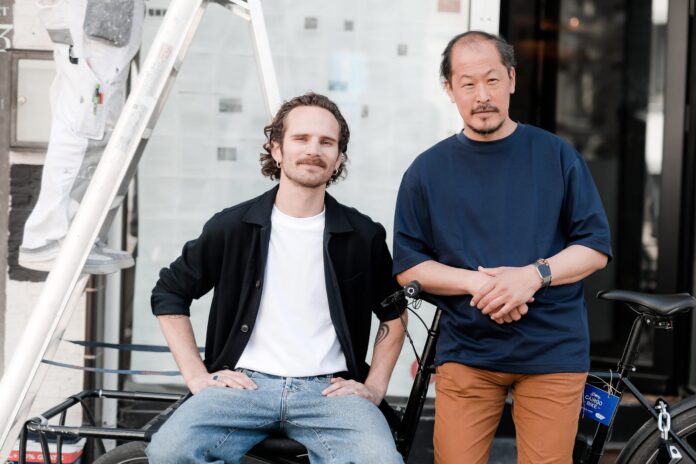Together editor Catherine Feore meets Michelin-starred chef Degeimbre at the opening of his latest venture.
Chef Sang Hoon Degeimbre, renowned chef and owner behind the two-Michelin starred L’air du temps in Liernu, near Namur, has decided to open a Korean restaurant in Saint Gilles. Anju is a Korean term for dishes served with alcohol; for want of a better description, it is the Korean equivalent of going to a very good tapas bar; think pintxos in San Sebastian.
“Anju is a Korean term for dishes served with alcohol”
The menu has an array of traditional Korean dishes. Degeimbre told Together that for him it is important to be really honest in his cuisine, adding that this applies to any of his restaurants (he has two other restaurants in Brussels: SAN Sablon on rue Joseph Stevens, Vertige on rue de Flandre); “Our sourcing is really important to us, all the products come from Belgium, from local producers. The techniques at ANJU, on the other hand, are coming from Korea.”
“Our sourcing is really important to us, all the products come from Belgium, from local producers”
Degeimbre says that L’air du temps still takes up 99% of his time, but he is working with trusted Executive Chef Victor des Roseaux and his team. Degeimbre has created the recipes and trained his chef in the finer points of Korean cuisine. While he may not be there all of the time, ANJU is the Michelin-star-winning chef’s way of creating a little bit of Seoul in the capital of Belgium.
Asked if Korean food was well known or understood in Belgium, Degeimbre said that while it wasn’t a cuisine that was widely known, restaurants like Maru (Chaussee de Waterloo 510) have done a lot to familiarize the Belgian public, so there is at least an idea: “We take some points of interest, from what people know about Korean food, and step-by-step we introduce more dishes.” Because the menu is based on locally sourced seasonal ingredients we can expect that the menu will adapt throughout the year.
“We take some points of interest, from what people know about Korean food and step-by-step we introduce more dishes”
I had the YUKHOE raw beef with sesame and bae pear, followed by PAJEON Korean pancakes with seasonal vegetables and kimchi. Sharing is caring and ANJU’s dishes are made for this. There are a selection of dishes which are served with Banchan. Banchan are small side dishes that are set in the middle of the table for all to enjoy and include: red kimchi, spinacci, sesame leaves, ssamjan and jjangaji. For my main course I enjoyed the GALBI BEEF, which is a variation of bulgogi – found on every street corner of Seoul. Galbi uses beef short ribs for extra flavour, the marinade is full of the tastes of Seoul: soy, garlic, Korean soy sauce for that extra umaminess, rice wine, sesame oil and I guess the rest is a trade secret!
“There is a selection of rice wines, known as makgeolli and Korean spirits, such as yedam, bekseju and soju jinro”
The restaurant has an excellent selection of wines, including natural wines from the Burgenland region of Austria. There is a choice of four rice wines, known as makgeolli, and Korean spirits, such as, yedam, bekseju and soju jinro. As it was a hot evening, I chose the Korean Sour beer, made in-house using black tea which had a sour – as it said on the tin – and slightly acidic taste, a very refreshing combination with the dishes we tasted. The soft drinks (OSAN) are also created in-house.
The decor is typical and elegant, but also modern. Photographs, pieces of art, traditional paper Korean characters, original and unique tableware by Juana Kelsey and ceramics add the final touches, allowing you to experience Seoul without adding to your carbon footprint.
no images were found
© Estelle Parewyck








